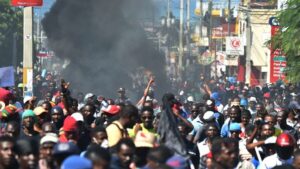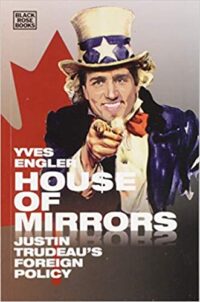
Hong Kong protesters trash MTR stations — Strait Times
Despite hundreds of thousands of Canadians having close ties with both Haiti and Hong Kong, only protests in the latter seem to be of concern to politicians.
Recently NDP MP Niki Ashton and Green MP Paul Manly were attacked ferociously in Parliament and the dominant media for participating in a webinar titled “Free Meng Wanzhou”. During the hullabaloo about an event focused on Canada’s arrest of the Huawei CFO, Manly — who courageously participated in the webinar, even if his framing of the issue left much to be desired — and Ashton — who sent a statement to be read at the event but responded strongly to the backlash in an interview with the Winnipeg Free Press — felt the need to mention Hong Kong. Both the NDP (“Canada must do more to help the people of Hong Kong”) and Greens (“Echoes of Tiananmen Square: Greens condemn China’s latest assault on democracy in Hong Kong”) have released multiple statements critical of Beijing’s policy in Hong Kong since protests erupted there nearly two years ago. So have the Liberals, Bloc Québecois and Conservatives.
In March 2019 protests began against an extradition accord between Hong Kong and mainland China. Hong Kongers largely opposed the legislation, which was eventually withdrawn. Many remain hostile to Beijing, which later introduced an anti-sedition law to staunch dissent. Some protests turned violent. One bystander was killed by protesters. A journalist lost an eye after being shot by the police. Hundreds more were hurt and thousands arrested.
During more or less the same period Haiti was the site of far more intense protests and state repression. In July 2018 an uprising began against a reduction in subsidies for fuel (mostly for cooking), which morphed into a broad call for a corrupt and illegitimate president Jovenel Moïse to go. The uprising included a half dozen general strikes, including one that shuttered Port-au-Prince for a month. An October 2019 poll found that 81% of Haitians wanted the Canadian-backed president to leave.
Dozens, probably over 100, were killed by police and government agents. Amnesty International, Human Rights Watch and other western establishment human rights organizations have all documented dozens of police killings in Haiti. More recently, Moïse has ruled by decree, sought to extend his term and to rewrite the constitution. Yet, I couldn’t find a single statement by the NDP or Greens, let alone the Liberals or Conservatives, expressing support for the pro-democracy movement in Haiti.

Do black lives in Haiti matter to the Canadian government? – Canadian Dimension
The imperial and class dynamics of Haiti are fairly straightforward. For a century Washington has consistently subjugated the country in which a small number of, largely light-skinned, families dominate economic affairs. During the past 20 years Canada has staunchly supported US efforts to undermine Haitian democracy and sovereignty.
Hong Kong’s politics are substantially more complicated. Even if one believes that most in Hong Kong are leery of Beijing’s growing influence — as I do — the end of British rule and reintegration of Hong Kong into China represents a break from a regrettable colonial legacy. Even if you take an entirely unfavorable view towards Beijing’s role there, progressive Canadians shouldn’t focus more on criticizing Chinese policy in Hong Kong than Canadian policy in Haiti.
 Echoing an open letter signed by David Suzuki, Roger Waters, Linda McQuaig and 150 others and the demands of those who occupied Justin Trudeau’s office last year, the national president of the Public Service Alliance of Canada, Chris Aylward, recently sent a letter to Prime Minister Trudeau critical of Canadian support for Moïse. It notes, “Canada must reassess its financial and political support to the Jovenel Moïse government, including police training, until independent investigations are conducted into government corruption in the Petrocaribe scandal and ongoing state collusion with criminal gangs.” The NDP, Greens and others should echo the call.
Echoing an open letter signed by David Suzuki, Roger Waters, Linda McQuaig and 150 others and the demands of those who occupied Justin Trudeau’s office last year, the national president of the Public Service Alliance of Canada, Chris Aylward, recently sent a letter to Prime Minister Trudeau critical of Canadian support for Moïse. It notes, “Canada must reassess its financial and political support to the Jovenel Moïse government, including police training, until independent investigations are conducted into government corruption in the Petrocaribe scandal and ongoing state collusion with criminal gangs.” The NDP, Greens and others should echo the call.
To prove they are more concerned with genuinely promoting human rights – rather than aligning with the rulers of ‘our’ empire – I humbly suggest that progressive Canadians hold off on criticizing Beijing’s policy towards Hong Kong until they have produced an equal number of statements critical of Canada’s role in Haiti.
• To learn more about Canada’s role in Haiti tune into this webinar Sunday on “Imperialist attacks on Haiti and Haitian resistance: Canada’s Imperialist Adventures in Haiti”.










